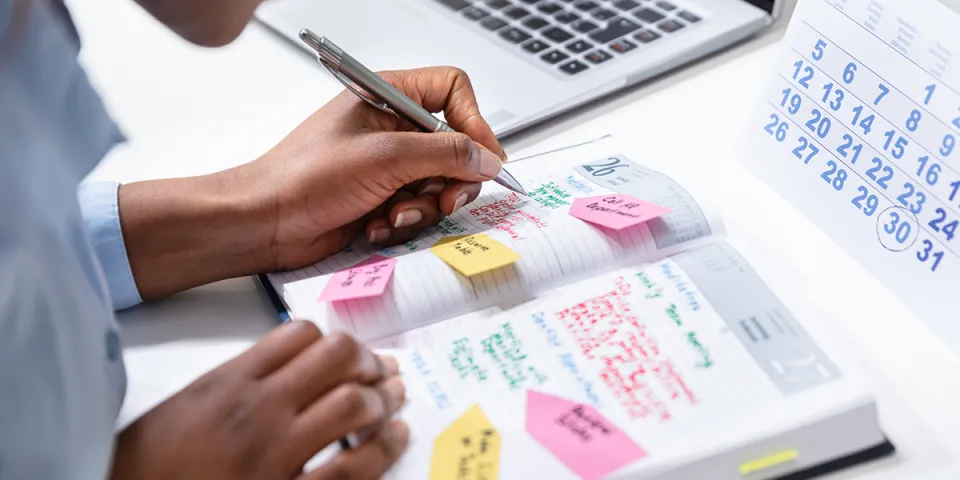Latest
How to Use a Planner Effectively
Oct 9, 2019

Keeping a to-do list can help you feel organized, but without proper planning, it’s easy for that list to get out of control. Using a personal planner can help you prioritize your tasks, improve your time management skills, and allow you to be more successful both in and out of the classroom.
Today, there are many time management apps that make planning a breeze, and there are also traditional planners for those who like to keep a hard copy with them at all times. Whatever your preference, using a planner can help you tackle your growing to-do list.
Here’s how to choose the right type of planner for your lifestyle and make it work for you.
Choosing the right type of planner
There are several different formats of planners, some of which are geared toward managing your short-term to-dos and others that are better for long-term projects and planning. Your lifestyle, schedule and your personal preferences will help you determine the best option for you.
Here are three of the most common styles of planners:
- Weekly/Monthly: This version uses a one-week-per-two-page spread, with planning space for each day of the week. It also includes a small monthly planning page at the start of each new month for more important reminders. This planner is useful for keeping track of weekly meetings and appointments. It can also be an effective method for college students to keep track of weekly due dates and homework assignments.
- Monthly: These are ideal if you like to see your commitments for the month at a glance. This type of planner comes in a desk-size version for extra writing space, or a pocket-size version that fits perfectly in a backpack for on-the-go use.
- Daily: The daily planner uses a one-day-per-page spread, which gives you ample space to plan out all of your daily tasks and reminders. This layout is ideal for college students or anyone who has a packed schedule or a long list of to-dos every day.
Each of these styles is also available in a digital format. Most smartphones come with a built-in calendar application that pulls in events and reminders from your connected email account. In addition to managing your daily schedule, you can set alerts and configure your calendar to pull in information from other apps, such as Notes or Reminders.
Google Calendar is one of the most popular digital planners, and it includes daily, weekly, and monthly spread options to meet your needs. Another digital planner that is specific to students is My Study Life. The app includes a homework tracker for due dates and assignments, as well as a calendar and a class schedule manager. Check out this blog post for more info on the best time management apps for students.
How to use your planner effectively
While choosing the right type of planner is important, learning how to use it effectively is the only way it will have a positive impact on your life.
Here are five tips to make the most of your planner:
1. Consistency is key
Studies have shown it takes up to two months to develop a new habit. Using a planner takes consistency and if you don’t use it every day, it will not be an effective tool. Keep your planner right by your bedside so that it’s the first thing see when you get up in the morning. Not only will this help you get into the habit of looking at your planner, it will also help you prepare for the day ahead.
2. Fill in important dates and deadlines right away
Get into the habit of writing down all important dates and deadlines as soon as you find out about them. This makes it easier for you to keep track of all of your responsibilities and ensures that all of your notes are in one place.
3.) Use color-coding to keep track of different items
Some students find it helpful to color-code their assignments, or use a bright color for important tasks or reminders. You might have up to five different classes as well as other commitments in a day, and it can be overwhelming if all of that information is crowded together in the same box in the same color pen. Using a different color for each class makes it easy to see what you have on your to-do list. This method can also be useful for remembering birthdays and other special events on a monthly basis.
4.) Implement time-blocking
Time blocking is the practice of planning out your day in advance and dedicating specific time blocks for certain tasks and responsibilities. This helps you predict what you can realistically accomplish each day and allows you to make better use of your free time. Setting aside a specific time for schoolwork can also help you improve your focus and your productivity.
5.) Use the extra features that the planner offers
Some planners have additional features in the front or back sections, such as “dates to remember,” goal trackers and password logs. Check to see if your planner offers any of these resources, and take advantage of them if so.
Personal planners are an effective way to organize your life and can positively improve your time management skills. It might take some trial and error to find what works best for you, but once you get into the routine of using a planner, it will most definitely make a difference in your life!
Find Your Program At Herzing University
Bureau of Labor Statistics (BLS), U.S. Department of Labor, Occupational Employment and Wage Statistics 2023 / Occupational Outlook Handbook 2022. BLS estimates do not represent entry-level wages and/or salaries. Multiple factors, including prior experience, age, geography market in which you want to work and degree field, will affect career outcomes and earnings. Herzing neither represents that its graduates will earn the average salaries calculated by BLS for a particular job nor guarantees that graduation from its program will result in a job, promotion, salary increase or other career growth.
Latest
Recent Blog Posts
Subscribe to our Newsletter
Get the latest news you need to know, from study hacks to interview tips to career advancement. Have it delivered right to your inbox biweekly.








